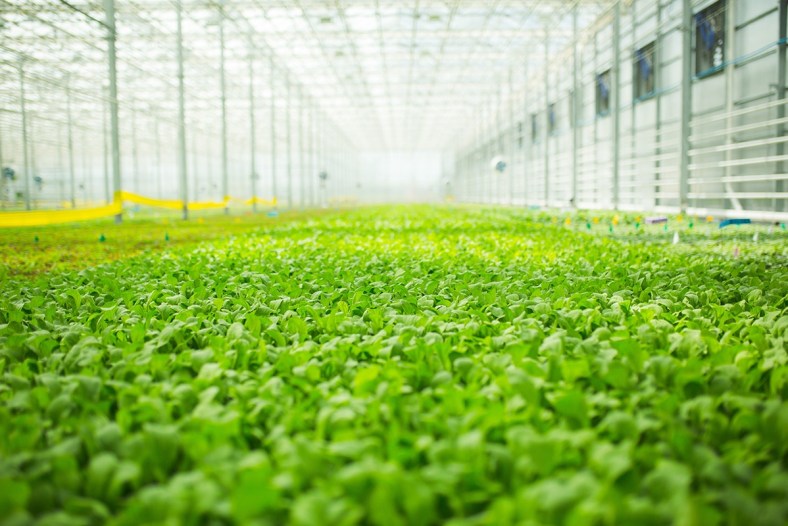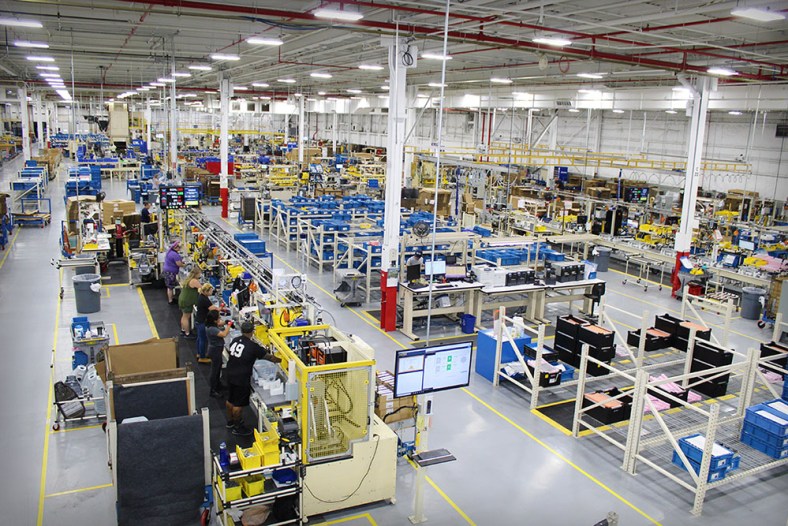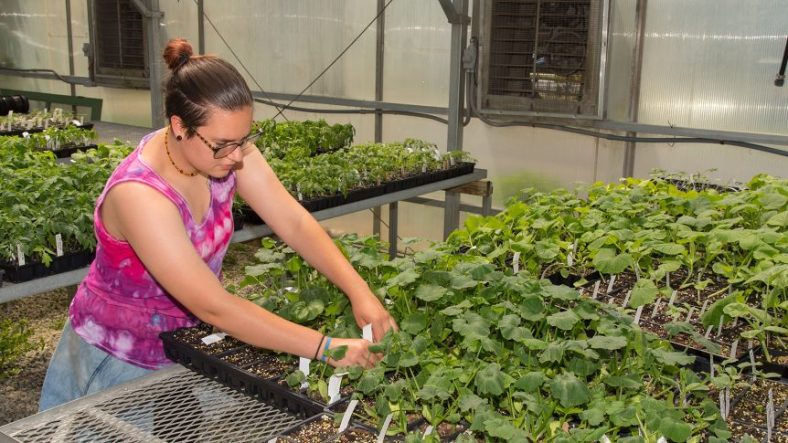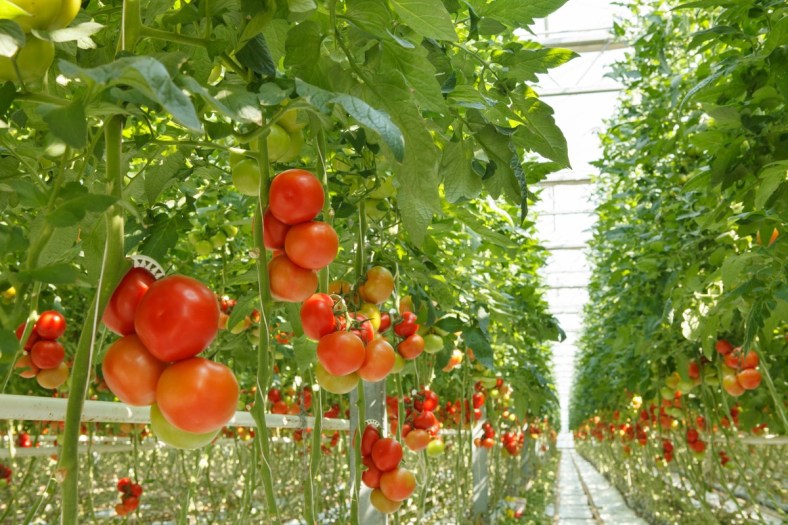Canadian-based Lakeside Produce has opened a 15-acre greenhouse vegetable operation in Henderson County, N.C., with plans to expand the facility to 45 acres. Photos courtesy of Mark Williams, Agribusiness Henderson County
An increasing number of controlled environment growers are looking at Henderson County, N.C., as having the right natural resources and market location for them to succeed.
Within a three-hour drive of Henderson County, N.C., are located 30 distribution centers for major supermarket and food service providers serving cities along the East Coast. Henderson County is also within 250 miles of Raleigh, Atlanta, Charleston, Nashville, and Cincinnati with easy highway access to regional and international airports in Asheville and Charlotte, N.C., Greenville, S.C., and Atlanta. Seventy-five percent of the U.S. population lives within a one-day drive of Henderson County.
“Henderson County is a prime location for any type of controlled environment agriculture,” said Mark Williams, executive director of Agribusiness Henderson County in Hendersonville, N.C. “Greenhouse operations fit well in this area for many reasons. At a land elevation of 2,200 feet, temperatures are moderate and there is plenty of sunlight year round. There is also an abundance of high quality water. It’s a perfect fit for controlled environment production.
“The one area where the county has some limits is on the availability of large tracts of flat land that is not in a flood plain area. To date we have been able to help growers locate sites for operations up to 45 acres.”
Seeking out potential ag businesses
One of the newest members of the Henderson County agribusiness community is BrightFarms, which opened a 280,000-square-foot greenhouse operation in April. The hydroponic grower is expected to produce over 2 million pounds of leafy greens annually. It will be the largest controlled environment grower of leafy greens in the state. The company is expected to invest $22 million to operate the facility, which will create 55 new jobs. BrightFarms also operates greenhouse production facilities in Illinois, Ohio, Pennsylvania and Virginia.

“BrightFarms was a company that we actually recruited to locate in Henderson County,” Williams said. “If there is a real interest on a company’s part, we will host company officials and introduce them to county officials and other ag businesses. We try to make the potential new company familiar with the area, the infrastructure that’s in place and all the supports that are here. Once Agribusiness Henderson County has successfully interested a company in locating here, we get involved not only in site selection, but also help to make connections with engineers, contractors and other service providers along with area distributors and markets. We serve as the go-between helping to connect all the dots. In terms of what Agribusiness does, the most important thing is creating and building relationships.”
One North Carolina Fund provided BrightFarms with a performance-based grant of $55,000 to assist the company in the operation of its Henderson County location. One North Carolina Fund provides financial assistance to local governments to help attract economic investment and to create jobs.
“At the county level, there is a standard tax deferment program that has been approved through our general assembly,” Williams said. “The program is based on the amount of investment by a company, the number of jobs created and the salaries those jobs are paying. If the company performs then it receives a tax deferment on its property taxes. This is the only project that Agribusiness has taken on that money was received specifically for the operation, but more seem interested in taking advantage of incentive programs.”
Overcoming land and labor issues
One of the biggest controlled environment projects that has been constructed in Henderson County is a 15-acre greenhouse facility built by Lakeside Produce. Headquartered in Leamington, Ontario, Canada, the company is producing greenhouse tomatoes and mini-cucumbers at this new location. Currently one of the largest greenhouse operations in Henderson County, the company plans to expand the facility to 45 acres.
“Unfortunately there aren’t many sites available within the county to allow the size capacity of a Lakeside Produce,” said Williams. “The county is limited in terms of land available. If a company needs 15-30 acres, there are numerous sites available within the county that meet those needs.
“When I learned Lakeside Produce had an interest in locating in Henderson County, I reached out to company officials. They came down to look around and were able to find a suitable site. The company has invested close to $40 million in the operation. By the time the facility is finished, Lakeside Produce will have invested over $100 million in the site. At this point the company has created about 120 jobs. The job force will eventually expand to around 300 jobs.”
Williams said an increasing number of production operations in North Carolina like in other states are looking to the H-2A Temporary Agricultural Workers program to find an adequate workforce.
“Labor is a tough situation regardless of where a company is located, it’s a global issue,” he said. “It’s becoming increasingly difficult to find people who are willing to work at base level jobs, especially with domestic labor and regardless of pay. Most growers are depending on foreign workers.
“Lakeside Produce, which relies on the H-2A program, built housing at its North Carolina facility to be able to accommodate guest workers. The workers will come in and work the crop and then go back to their home countries. In terms of the labor pool that is the direction many growers have had to go. In regards to higher level management positions, there haven’t been any real problems filling those positions yet, but as the controlled environment industry grows, demand increases and more specialized training is needed.”
High on Henderson County

Williams said that every month he meets with an agribusiness that is considering locating in Henderson County.
“Not all of these companies are affiliated with controlled environment agriculture,” he said. “I’m hopeful that we see more expansion in vertical farming as well as greenhouses. What would be suitable for us would include any type of operation looking to produce leafy greens, herbs and strawberries. We are not limited to these crops, but that’s where we think the potential is highest based on proximity to markets, acreage availability and economic feasibility.”
One vertical farming operation that Williams is working with is AgriFacture. The company has transitioned from a start-up phase and is building a vertical farm facility on a commercial scale to produce mushrooms.
“This new operation should be up and running within the next few months,” he said. “The company is looking to eventually expand beyond mushrooms to other crops that could include herbs, microgreens or leafy greens. There is also an increasing interest and research in vertical farm strawberry production.”
Engaging CEA growers, students
The increase in controlled environment growers locating in Henderson County has the potential to expand business for one of the county’s largest manufacturers. GE Current, a Daintree company, has been manufacturing lighting fixtures at its Hendersonville factory since 1955. Recently the company began manufacturing its new Arize Factor LED grow lights at this facility and will also add production of its updated Arize Element grow light series.
Mike Armstrong, director of Strategic Growth Initiatives at Current, said the company’s involvement with the CEA industry is not new, but the addition of LED grow light product lines in Hendersonville offers the company the opportunity to work with both growers and the educational community in the area.
“We’ve had good fact-finding meetings to open dialogue with local businesses and agribusiness and county officials,” Armstrong said. “We’ve discussed the possibility of initiating conversations with administrators at the local Blue Ridge Community College and North Carolina State University. We could envision various educational or training programs with these schools. Just like we have internships for engineering positions, there is the potential opportunity to provide internships in the areas of horticulture and agriculture lighting and related applications. We are just getting started in terms of our engagement related to controlled environment agriculture in Henderson County.
“There is also a lot of work going into introducing Current to growers in the county. We have had opportunities to talk about advancing technologies in all areas of greenhouse growing. We have been introduced to the growers in the county through the assistance of Agribusiness Henderson County. This has opened the door for potential collaboration on testing our LED products for specific crops.”

Armstrong said Current is also looking at opportunities for ways the company can engage potential future employees, including establishing internship programs.
“There have been discussions about working with the local educational community including Blue Ridge Community College, which is looking at putting in a teaching and testing greenhouse on its campus,” he said. “We are in the process of making a major investment to upgrade a lighting education and training facility on our Hendersonville campus. The facility will open later this year and will include our horticultural lighting products where we will be able to demonstrate how they work. There are a lot of opportunities not only from the commercial side, but also education and research-and-development, the training of young people and community engagement with local schools to work with them.”
For more: Agribusiness Henderson County, (828) 697-4543; mwilliams@hendersoncountync.org; https://www.agrihc.org/. GE Current, a Daintree company, Jim Benson, (216) 534-4166; james.benson@gecurrent.com; https://www.gecurrent.com/.
This article is property of Urban Ag News and was written by David Kuack, a freelance technical writer in Fort Worth, Texas.


